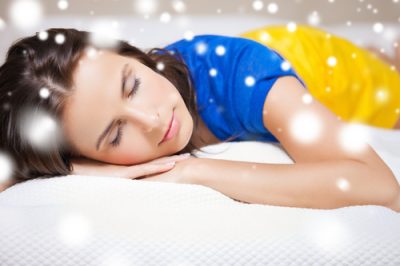Ahh, winter break. Vacation. Days off. Sleeping in. And yet… you still feel completely exhausted. You wake up a lot at night. You’re ready for a rest but you just can’t seem to get it (and the kids aren’t even waking you up). What gives? Sleep apnea could be the problem, and a serious one at that.
What is the most common type of sleep apnea? >>
Understanding Sleep Apnea
You may have never been properly diagnosed with sleep apnea, but you may actually be suffering from this serious and chronic health condition. People with sleep apnea experience interruptions during sleep. They may pause while breathing or their breath may become shallow. These breaks in normal breathing patterns can last for just a few seconds or, more frighteningly, even for a few minutes. The disruption in breathing often jars people (and their spouses, in the case of snorers with sleep apnea) out of a deep sleep.
The reason people often are unaware of their sleep apnea is that the condition does not always wake you into full consciousness. However, it’s the state of being moved into a lighter sleep that interferes with your ability to stay in REM and achieve the kind of quality sleep you need to feel well-rested.
Snoring impacts quality of sleep – your Red Bank dentist can help >>
The Holidays Can Complicate Sleep Apnea
At a time of year when you might not get much rest because of late-night celebrations, sleep apnea is probably the last thing to cross your mind when you’re feeling excessively tired during the day. You are also more susceptible to colds and other respiratory illnesses at this time of year, so rising with a sore throat may not seem very suspect. If you wake with a headache, dry mouth, or irritable, you may chalk that up to enjoying the previous night’s revelry a little too much. But, actually, these are all symptoms of sleep apnea.
Of course, there are other more obvious symptoms of sleep apnea that you – and your partner – should be aware of and keep watch for, like restless sleep. Incredibly loud snoring which disturbs your sleep, or the sleep of others, could indicate sleep apnea. And, even though you aren’t getting enough rest as it is, insomnia can actually be a symptom of sleep apnea.
7 signs you are not well-rested >>
How Your Dentist Can Help with Sleep Apnea
Your dentist is actually one of the best medical professionals to help you manage and overcome your sleep apnea. First, a proper diagnosis will be necessary to determine if you do actually have sleep apnea, so it will be important to report typical nighttime occurrences or known sleep interruptions. It may even be necessary to videotape yourself when sleeping to truly know what’s happening with your sleep when you are in a rest cycle.
Ideally, your Red Bank dentist will be able to prescribe an oral appliance to help restore your normal breathing patterns and maintain this effort during sleep. The sleep apnea mouth guards are customized to fit over both your upper and lower teeth. The goal is to realign the position of the tongue and jaw so your airway stays open.
Ready to really get some rest? Contact Dr. Carole Sherrod Jewell at Red Bank Dentistry in Red Bank, NJ, for your sleep apnea consultation and treatment.



